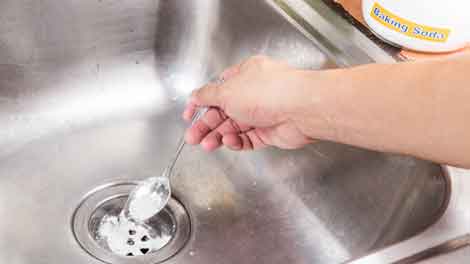Clogged drains can cause water damage to your home. Fortunately, not every stopped drain requires a plumber to come out and take care of it for you.
Using simple household items can free most stoppages from sink or tub drains. A combination of baking soda and vinegar can create a fizzing action that breaks light blockages apart.
1. Dish Soap
There are many products on the market that promise to clear clogged drains, but they can often cause more damage than good. The good news is, there are many simple ways you can unclog a drain without harmful chemicals.
For kitchen-sink clogs, use dish soap to break up grease and food particles. It’s also helpful for bathroom clogs caused by hair.
For more serious clogs, try using a power auger or snake. This tool is typically sold with a plastic wand that has burrs along its edge to snag and pull out hair, as well as an accordion-like rod that applies a lot of force to stubborn blockages. It may also help to remove the pop-up assembly in the sink and clear out any standing water, which breeds mold, bacteria and insects.
2. Baking Soda

One cup of baking soda (sodium bicarbonate) can help clear minor clogs, particularly those caused by food debris or hair. This trick relies on a chemical reaction between vinegar and baking soda (the same type of reaction you likely experienced as a kid when staging your very own volcano eruption).
After pouring one cup of baking soda down the drain, immediately follow it with one cup of distilled white vinegar. The quick, audible reaction you hear is the result of vinegar’s acetic acid neutralizing the alkaline sodium bicarbonate, creating carbon dioxide gas. As the bubbles pass through the clogged drain, they also dislodge any trapped food particles or grease. Once the clog has been cleared, flush with boiling water to prevent a recurrence. This method is safer and more eco-friendly than using caustic soda (sodium hydroxide), the main ingredient in commercial drain cleaners.
3. Vinegar
One of the most commonly used green cleaners is vinegar. Not only is it a natural product, but it is also effective at removing drain gunk. This method is especially useful for bathroom sinks, where clogs tend to be made up of hair, toothpaste, or shaving fallout, navigate to this website.
Pour a cup of white vinegar into your drain. This will cause a chemical reaction, which should produce a lot of foaming. Allow this to sit for about five minutes. While waiting, heat two cups of water to a boil and flush your drain with this.
Avoid using this method if you’ve used a commercial drain cleaner recently or if the pipe is made of metal or plastic. These materials can corrode, creating a dangerous situation. Also, don’t use this method if there is standing water in the drain.
4. Boiling Water
If your clogged drain hasn’t been helped by baking soda or vinegar, try adding boiling water. Make sure the water is at a rolling boil before pouring it down the sink. This should cause the clog to fizz and dissolve. Once the clog is gone, rinse with hot water.
Many clogs are caused by grease that hardens in the pipes. Using salt and boiling water helps to break down this type of clog.
This is a great alternative to chemical cleaners, which are bad for your pipes and the environment. Use this natural top clogged drain solution on a regular basis to prevent future clogs. The best part about this method is that it’s completely safe for your pipes! Plus, it’s super easy. All you need is a wire coat hanger and pliers.
5. Coat Hanger
If you’ve tried pouring baking soda and vinegar, using a plumber’s snake, or boiling water, but your drain is still completely clogged, then it’s time to call in the pros. If the clog is in a highly used area, like the kitchen sink, then it’s even more important to get it fixed as quickly as possible to avoid any potential water damage.
Conclusion:
Take a wire coat hanger and bend one end into a hook that is no bigger than a half-inch wide. Push it down the drain and try to hook any gunk you can feel on the end of the hanger. If it hooks onto the clog, pull the hanger up and dump the gunk into a waste basket. Repeat as needed. This method is especially effective on shower drains that tend to clog from hair.











 How Do You Do Healthy Eating?
How Do You Do Healthy Eating?